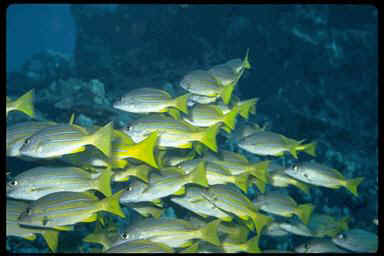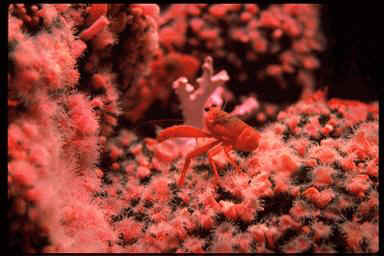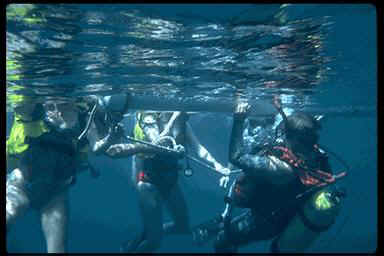Study Aquaculture in Australia
Science of the Seas: James Cook University
 Aquaculture refers to the growing practice of farming fish and plants in both salt or freshwater environments. It is becoming an increasingly popular market as shown by the rise of Australia produce in recent years with more than 60 species now being humanely farmed including pearl oysters, mussels, salmon, algae and even crocodiles! Aquaculture refers to the growing practice of farming fish and plants in both salt or freshwater environments. It is becoming an increasingly popular market as shown by the rise of Australia produce in recent years with more than 60 species now being humanely farmed including pearl oysters, mussels, salmon, algae and even crocodiles!
Why is this Because more people are eating seafood! Many people, particularly in the Asia-Pacific region, consider seafood as essential to their diet; indeed, even some vegetarians do not consider the 'meats of the sea' to be taboo to their eating habits. Consequently, Australia's aquaculture industry is now an important supplier of seafood to both Australian and overseas markets, due to its remarkably clean environment and wide variety of species, both on land and in the water.
The value of the industry has grown enormously, with a gross value increasing from $49 million in 1985 to $404 million in 1994, a large portion of which is exported around the world, particularly to wealthy countries such as Japan, Hong Kong, the United States and Singapore.
 Successful aquaculture rests on a combination of factors: Biological Techniques and Farming Practices Under .State laws governing water supply and disposal of liquid waste, aquaculture farms have been licensed to ensure that farming practices are both economical and environmentally acceptable. Responsibility for managing the industry is not covered by a ruling body, but rests with the farmers themselves; however, the Commonwealth and State Governments have produced a 'National Strategy on Aquaculture in Australia' to outline important issues regarding the growth of the industry, and suggests ways to keep it environmentally humane and accessible. Successful aquaculture rests on a combination of factors: Biological Techniques and Farming Practices Under .State laws governing water supply and disposal of liquid waste, aquaculture farms have been licensed to ensure that farming practices are both economical and environmentally acceptable. Responsibility for managing the industry is not covered by a ruling body, but rests with the farmers themselves; however, the Commonwealth and State Governments have produced a 'National Strategy on Aquaculture in Australia' to outline important issues regarding the growth of the industry, and suggests ways to keep it environmentally humane and accessible.
Site Selection - Aquaculture farms are naturally located near to Australia's famous coast-lines, sharing the sites with other coastal developers, including those involved in the tourism industry, as well boating and fishing enthusiasts. However, aquaculture production does continue inland, with farmers using dams or ponds to grow fish and crustaceans. Most 'farms' are small, located away from the main cities, but playing an important role in the economic growth of rural communities in Australia. A wide range of species can now be produced, due to the unique climate conditions around Australia; salmon spawn in the cool southern waters of Tasmania, whilst crocodiles are farmed in the warmer Northern Territories.
 Suitable Markets- It is now possible to control the conditions of farming for aquaculture products. This provides advantages in terms of quality, as stock can be grown to order, with any production problems easily solved at the source, and the ability to meet market demand, as products of the same size or taste can be supplied even in times of great demand, to meet high prices and reap the profits. Why is this important to you, the student Because the skills necessary in aquaculture need to be learned and more and more departments dealing specifically with this topic are springing up at universities and institutions around Australia. It is now possible to carry out an undergraduate or postgraduate degree in Aquaculture as an academic subject, or even to specialise in a particular area of interest through a Research Degree. This may be under the heading of 'Earth Sciences', 'Marine Ecology' or 'Environmental Management', but certain institutions, such as Deakin University or James Cook University, offer a PhD in Aquatic Science / Aquaculture, including research projects on the subject of water-food production and ecologically effective farming methods - even looking to the future, on how we can advance aquaculture via genetics. Suitable Markets- It is now possible to control the conditions of farming for aquaculture products. This provides advantages in terms of quality, as stock can be grown to order, with any production problems easily solved at the source, and the ability to meet market demand, as products of the same size or taste can be supplied even in times of great demand, to meet high prices and reap the profits. Why is this important to you, the student Because the skills necessary in aquaculture need to be learned and more and more departments dealing specifically with this topic are springing up at universities and institutions around Australia. It is now possible to carry out an undergraduate or postgraduate degree in Aquaculture as an academic subject, or even to specialise in a particular area of interest through a Research Degree. This may be under the heading of 'Earth Sciences', 'Marine Ecology' or 'Environmental Management', but certain institutions, such as Deakin University or James Cook University, offer a PhD in Aquatic Science / Aquaculture, including research projects on the subject of water-food production and ecologically effective farming methods - even looking to the future, on how we can advance aquaculture via genetics.
So if you are interested in agricultural techniques or the environment, why I not specialise in this exciting up and coming industry Especially when it is located in the crystal waters of one of the most hospitable and beautiful countries in the world.
James Cook University
Townsville
Queensland
QLD 4811
Tel: +617 4781 4401
Fax: +617 4781 5988
Web:
www.jcu.edu.au/
E Mail:
EnquiriesTownsville@jcu.edu.au InternationalStudent@jcu.edu.au
|
|

James Cook University
Townsville
Queensland
QLD 4811
Tel: +617 4781 4401
Fax: +617 4781 5988
Web:
www.jcu.edu.au/
E Mail:
EnquiriesTownsville@jcu.edu.au
InternationalStudent@jcu.edu.au
|

 Aquaculture refers to the growing practice of farming fish and plants in both salt or freshwater environments. It is becoming an increasingly popular market as shown by the rise of Australia produce in recent years with more than 60 species now being humanely farmed including pearl oysters, mussels, salmon, algae and even crocodiles!
Aquaculture refers to the growing practice of farming fish and plants in both salt or freshwater environments. It is becoming an increasingly popular market as shown by the rise of Australia produce in recent years with more than 60 species now being humanely farmed including pearl oysters, mussels, salmon, algae and even crocodiles!
 Successful aquaculture rests on a combination of factors: Biological Techniques and Farming Practices Under .State laws governing water supply and disposal of liquid waste, aquaculture farms have been licensed to ensure that farming practices are both economical and environmentally acceptable. Responsibility for managing the industry is not covered by a ruling body, but rests with the farmers themselves; however, the Commonwealth and State Governments have produced a 'National Strategy on Aquaculture in Australia' to outline important issues regarding the growth of the industry, and suggests ways to keep it environmentally humane and accessible.
Successful aquaculture rests on a combination of factors: Biological Techniques and Farming Practices Under .State laws governing water supply and disposal of liquid waste, aquaculture farms have been licensed to ensure that farming practices are both economical and environmentally acceptable. Responsibility for managing the industry is not covered by a ruling body, but rests with the farmers themselves; however, the Commonwealth and State Governments have produced a 'National Strategy on Aquaculture in Australia' to outline important issues regarding the growth of the industry, and suggests ways to keep it environmentally humane and accessible. Suitable Markets- It is now possible to control the conditions of farming for aquaculture products. This provides advantages in terms of quality, as stock can be grown to order, with any production problems easily solved at the source, and the ability to meet market demand, as products of the same size or taste can be supplied even in times of great demand, to meet high prices and reap the profits. Why is this important to you, the student Because the skills necessary in aquaculture need to be learned and more and more departments dealing specifically with this topic are springing up at universities and institutions around Australia. It is now possible to carry out an undergraduate or postgraduate degree in Aquaculture as an academic subject, or even to specialise in a particular area of interest through a Research Degree. This may be under the heading of 'Earth Sciences', 'Marine Ecology' or 'Environmental Management', but certain institutions, such as Deakin University or James Cook University, offer a PhD in Aquatic Science / Aquaculture, including research projects on the subject of water-food production and ecologically effective farming methods - even looking to the future, on how we can advance aquaculture via genetics.
Suitable Markets- It is now possible to control the conditions of farming for aquaculture products. This provides advantages in terms of quality, as stock can be grown to order, with any production problems easily solved at the source, and the ability to meet market demand, as products of the same size or taste can be supplied even in times of great demand, to meet high prices and reap the profits. Why is this important to you, the student Because the skills necessary in aquaculture need to be learned and more and more departments dealing specifically with this topic are springing up at universities and institutions around Australia. It is now possible to carry out an undergraduate or postgraduate degree in Aquaculture as an academic subject, or even to specialise in a particular area of interest through a Research Degree. This may be under the heading of 'Earth Sciences', 'Marine Ecology' or 'Environmental Management', but certain institutions, such as Deakin University or James Cook University, offer a PhD in Aquatic Science / Aquaculture, including research projects on the subject of water-food production and ecologically effective farming methods - even looking to the future, on how we can advance aquaculture via genetics.